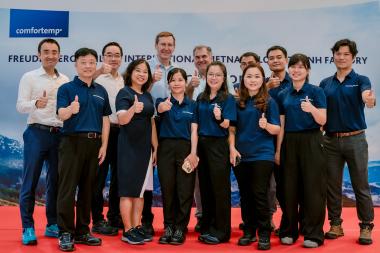German Pavilion returning to Cinte Techtextil China
The German Pavilion is confirmed to return from 19 – 21 September at the Shanghai New International Expo Centre. For the first time since borders reopened, industry leaders gathering under the banner will bolster the fair’s innovation and sustainability with a comprehensive showcase, from raw materials to machinery, complemented by diversified fringe events across the fairground.
Located in a prime area of the International Hall, the German Pavilion is set to draw crowds with its reputable products and technology. Assembling under the pavilion this year will be some new and returning German exhibitors, having made their names in the sub-categories of automotive nonwovens, industrial-use monofilaments, weaving machinery, and many more. After confirming their participation, Hansa Industrie-Mixer, J.H. Ziegler Nonwovens and New Materials, Lindauer Dornier, Monosuisse, and Perlon will showcase their expertise together with other highlighted exhibitors, including:
- Autefa Solutions – A full-service provider for turnkey nonwoven lines and machines, the company offers machines for fibre opening and blending, carding, crosslapping, needle punching, spunlace, thermobonding, amongst others. At the fair, the company will showcase technology spanning 10 application areas.
- Emtec Electronic – The company develops specialised test devices for the nonwoven and textile industries. An innovation said to quantify handfeel, its TSA Tactile Sensation Analyzer objectively measures the softness, smoothness and stiffness of textiles and nonwovens, as well as their recovery and elongation.
- Neuenhauser Group – The Neuenhauser Textile division provides fully-automated cleaning systems, transport automation solutions, winding technology, high-performance can coilers and weaving machine accessories. With decades of experience, the Group will debut at the fair with various innovative Agrotech, Buildtech, and Geotech solutions.
- Reifenhauser Enka Tecnica – A specialised provider of spinnerets and precision components to the man-made fibre industry. The company manufactures a broad spectrum of spinnerets and spin packs for all spinning processes, as well as premium jet strips for hydro-entangling with extra-long service life.
- Reifenhauser Reicofil – A well-known provider of spunbond, meltblown and composite lines for nonwoven applications in the hygiene, medical, filtration and industrial sectors. Offering a wide range of machinery at the show, the company is developing technical solutions for sophisticated and sustainable applications, with a strong focus on machine intelligence and energy efficiency.
New fringe events to further advocate innovation and sustainability
At this year’s fair, AiDLab[1] will present its AI-based Textile Inspection System (AiTIS). A world first, AiTIS automatically and accurately detects material defects in nonwovens (especially for mask making), and various textiles, reflecting the collaborative efforts of AiDLab and a Hong Kong healthcare brand. At the event, Professor Calvin Wong, CEO & Centre Director of AiDLab, will introduce the system. This will be followed by a panel discussion and Q&A session with independent consultant Mr Eric Sham and moderated by AiDLab’s Mr Barry Tai, including insights on how advanced technology is reshaping the textile industry landscape.
Going beyond innovation, the fringe programme will also for the first time include Econogy Talks[2] and sustainability tours to reflect Messe Frankfurt’s commitment to a sustainable future. Fairgoers can also visit the Innovation Showcase Area for outstanding industry achievements, with the focus this year on cutting-edge technology, green development and high-end applications. Product submission is now open. Contact us to submit your products, or register here for your visitor badge.
The fair’s product categories cover 12 application areas, which span a full range of potential uses in modern technical textiles and nonwovens. These categories also cover the entire industry, from upstream technology and raw materials providers to finished fabrics, chemicals and other solutions. This scope of product groups and application areas ensures that the fair is an effective business platform for the entire industry.
Cinte Techtextil China will be held from 19 – 21 September 2024.
[1] The Laboratory for Artificial Intelligence in Design, jointly established by The Hong Kong Polytechnic University and the UK’s Royal College of Art, under HKSAR government funding
[2] ‘Texpertise Econogy’ – the umbrella for Messe Frankfurt’s sustainability activities at its more than 50 textile trade shows worldwide
Messe Frankfurt (HK) Ltd









